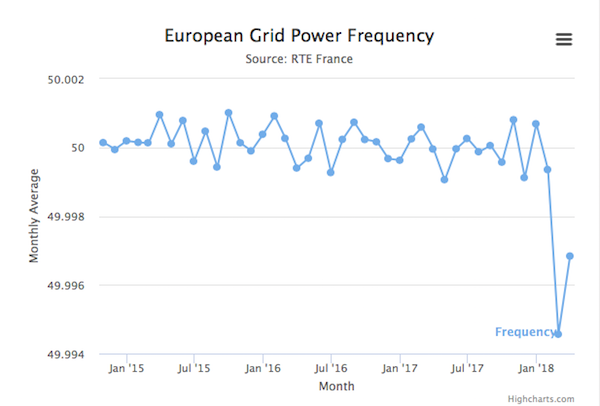

If you have been running late for work or overcooking food in the kitchen, don't worry - you can now blame it on your electrical clock, and not your time-keeping skills. And no, it's not an early April Fool.
Because Jersey takes the majority of its power from the European grid, local clocks are on 'go slow' thanks to problems in...Kosovo.
Electric clocks, perhaps on an oven, microwave or heating system, keep time based on the frequency in the electricity grid - and if the frequency changes, they can run either slightly fast or slow.
It's believed Kosovo has been sapping a small amount of energy from their neighbour's local grid - that has caused a domino effect across Europe's 25-nation synchronised high voltage power network, spanning the continent.
The continental network had lost 113GWh of energy since mid-January because Kosovo had been using more electricity than it generates, slowing the frequency of the European grid to an average of 49.996Hertz.

Pictured: The European Power grid Frequency has dropped due to a dispute between Serbia and Kosovo.
Ben Watts, founder of Kilowatts.io says the dispute between Serbia and Kosovo is based on,"...how much electricity Kosovo should contribute to the power grid. Their power grid is still largely integrated; however Kosovo's ageing power plants have struggled to generate enough power. As a result, all around Europe, from town halls, to alarm clocks and ovens; clocks that rely on the mains frequency have slipped around 6 minutes (340 seconds to be precise) later since mid January. The Balkans are, quite literally, dragging the rest of the continent back in time.
"The European grid is the largest single synchronised grid in the world; spanning from Portugal to Poland and Germany to Greece. A bit like the single market or monetary union, it's a symbol of European integration and co-operation. Only more peripheral parts of Europe like the UK, Ireland, Nordics and Baltics aren't affected as their power grids, while linked to the European grid are not synchronised with it (further explanation below). The loss of 113GWh of electricity is worth about €4m; (this assumes an average price of €35/MWh).
A European Network of Transmission System Operators for Electricity spokesperson said it was working on a solution that could bring the system to normal with "a few weeks."
Comments
Comments on this story express the views of the commentator only, not Bailiwick Publishing. We are unable to guarantee the accuracy of any of those comments.